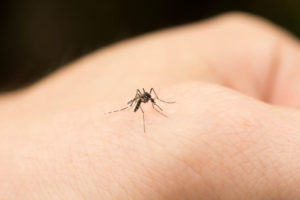The summer is here and that means longer days and evenings spent outdoors. It also means an increased risk of getting bitten by mosquitos.
Mosquito bites occur when a female mosquito feeds on your blood. Mosquitoes select their victims by evaluating scent, exhaled carbon dioxide and the chemicals in a person’s sweat. When bitten, the proteins in the mosquito’s saliva trigger a mild immune system reaction. That reaction appears as a white, itchy bump on our skin.
The bump usually clears up on its own in a few days, but occasionally a mosquito bite can cause a large area of swelling, soreness and redness. This type of reaction is most common in children or adults not previously exposed to the type of mosquito that bit them, and people with immune system disorders. In these people, mosquito bites can also trigger a low-grade fever, hives, or swollen lymph nodes.
If mosquito bites lead to more serious symptoms — such as fever, headache, body aches and signs of infection — contact your doctor.
Mosquitos are also carriers of many diseases, including West Nile virus, malaria, yellow fever and dengue fever. While most of the diseases carried by mosquitos are found in other parts of the world, West Nile virus is now transmissible in the United States. In fact, doctors from Flushing Hospital were the first to identify the initial outbreak in 1999 and worked with health authorities to limit the exposure to the community.
Now Flushing Hospital wants to offer our community the following tips on how they can protect themselves from mosquito bites:
- Wear protective clothing such as long pants and long sleeved shirts, particularly between dusk and dawn when mosquitos are most active
- Avoid shaded, bushy areas where mosquitos like to rest
- Remove any places where standing water can collect on your property, such as tires, cans, plastic containers fire pits, or pots
- Make sure your roof gutters drain properly. Clean clogged gutters in the spring and the fall
- Clean and chlorinate your swimming pools, outdoor saunas or hot tubs and drain water from pool covers
- Change the water in your bird baths at least every three to four days
- If you have severe reactions to mosquito bites, consider taking a non-drowsy, nonprescription antihistamine when you know you’ll be exposed to mosquitoes
- Apply insect repellents that contain DEET as they are considered most effective
When applying insect repellent, it is important to follow a few safety measures including making sure you spray it on outdoors and away from food. If you’re using sunscreen, put it on about 20 minutes before applying the repellent and don’t apply repellent over sunburns, cuts, wounds or rashes. When you go indoors, wash with soap and water to remove any remaining repellent.
Insect repellent with DEET is generally safe for children and adults, with a few exceptions. It is important to read the label carefully as infants and those with immunity complications should not use it. If you have any questions, you should consult your doctor.
By taking these precautions, Flushing Hospital hopes to help you limit your chances of becoming bit by a mosquito this summer.
All content of this newsletter is intended for general information purposes only and is not intended or implied to be a substitute for professional medical advice, diagnosis or treatment. Please consult a medical professional before adopting any of the suggestions on this page. You must never disregard professional medical advice or delay seeking medical treatment based upon any content of this newsletter. PROMPTLY CONSULT YOUR PHYSICIAN OR CALL 911 IF YOU BELIEVE YOU HAVE A MEDICAL EMERGENCY.

